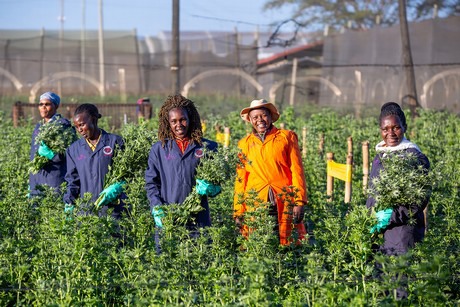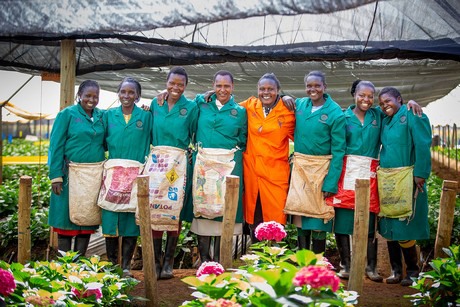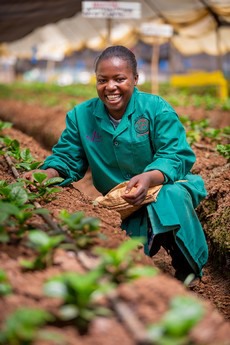Very few companies realize how important the culture of your business is", says Richard (Kiki) Fernandes CEO of the Marginpar group. Over the recent years, this company with flower farms in Zimbabwe, Tanzania, Kenya and Ethiopia invested heavily in social matters and in 2012, they implemented a Japanese method of working in Kenya, called 'Kaizen', or what they refer to as Hamuka. "With Kaizen, we were able to almost double their production between 2012 and 2017, with same number of employees and without expanding our m2."

Richard Fernandes. He explains the story in their recently published magazine 'The story of M'. Check out the magazine here.
“We have asked ourselves the central question: ‘how do we want to interact with our people?’. The focus is mainly on our branches in Africa, where we try to offer practical help. For example, we assist the villages in the vicinity of our projects. This can be about water supply, but also about training. If our employees make specific requests, we help them. Furthermore we embraced and implemented the Kaizen-method throughout our company. The Japanese word kaizen means "change for better". For us it also means trust and improvement.”

It’s all about trust
In 2012 Marginpar implemented a Japanese method of working, called “Kaizen”, or what they refer to as Hamuka. "It’s about culture and organisation in which trust is a key element. Moving away from the traditional ‘top down’ approach, it’s not about the management and those individuals in positions of power pushing things to get done, while the employees beneath them don’t understand what’s happening and why. It’s about an organisation that values people. Look, most people come to do a good day of honest work. That’s why you have to ask yourself why things go wrong. It’s not about who is the problem, but what is the problem. It’s all about trust. Trust is so important. Thanks to this attitude people can actually grow.“
Value adders
"Our management is based on trusting, valuing and empowering people. A lot of our staff, or value adders as we call them, have grown thanks to this way of thinking. They started with a red cap, as unskilled workers, and are now our managers. Take Miriam for example. She started as a junior and is now a Farm Manager at our Thika farm. The same goes for Adan, our Kaizen Coordinator. Although he couldn’t go to high school, he has grown into his role and has become an excellent coordinator. Our current HR manager started in production, she became a cleaner at the office and because we recognized that she was eager to learn, we paid her school fees.”

Increased performance
“Kaizen - Hamuka not only grows people. We have increased our performance and production per m2 and we have increased our turnover. That’s where the benefits are coming from. In the meantime, our people are happy. We look after them. We want to have a decent working environment for them: clean and effective. As Kaizen says: a place for everything and everything in its place. We’re a very open company in terms of financial and strategical information. We try to share where we are now and where we are going with the different teams involved. Everyone knows about our company’s targets and everybody knows their own personal target.”
Our people are number one
" With Kaizen we were able to almost double our production between 2012 and 2017. We achieved this with the same number of employees and we did it without expanding our m2. We use only what we need, meaning we have practically no inventory. We turn our inventory over 52 times in a year, meaning that we hold only one weeks inventory in our stores. To achieve this you must have a good relationship with our suppliers, so we invest in this. That’s also something I’ve learned from Kaizen: business is about partnerships, it’s all about relationships. Look after your people and they will look after your customers. Your people are number one.
With Kaizen we were able to almost double our production between 2012 and 2017. We achieved this with the same number of employees and we did it without expanding our m2. We use only what we need, meaning we have practically no inventory. We turn our inventory over 52 times in a year, meaning that we hold only one weeks inventory in our stores. To achieve this you must have a good relationship with our suppliers, so we invest in this. That’s also something I’ve learned from Kaizen: business is about partnerships, it’s all about relationships. Look after your people and they will look after your customers. Your people are number one.
Social responsibility
“We have a social responsibility. We have an impact on our employees but also on our environment and the communities in which we operate. We have a corporate social responsibility. We’ve helped build several schools and additional class rooms. We support children going to high school. We support the physically handicapped. We partner with the government concerning security issues like burglary and carjacking. We try to improve the roads. We know there are issues with clean drinking water, so every employee on the farms is allowed to take five litres of clean water home each day. We have a nurse and a medical team on each farm. We also provide soap and other essentials to day care centres. We acknowledge that problems in the community have an impact on the employees and their production, so we want them to know that they can turn to us.” Click here for several of their social projects.
Farm Manager Peterson tells his story about working on one of Marginpars flower farms.
Marginpar - where it all started
Marginpar currently produces 250 million stems annually on 17 production locations in 4 African countries on a total acreage of 450 ha. But where and when did their story started? "It started in Zimbabwe in 1988. We were one of the first to introduce fresh cut flowers from Africa to the Dutch Flower auctions." It is all explained and shown in their glossy magazine "The Story of M." that they released earlier this month.
The Story of M. magazine
In this 'one-time' magazine, one can read up on their farms in Africa (Zimbabwe, Tanzania, Kenya and Ethiopia), how they use the Kaizan method to get the best out of every one, the process of breeding and fun facts about their flowers - which are almost 100 different varieties
For more informatio n
n
Marginpar
Email:[email protected]
www.marginpar.nl
